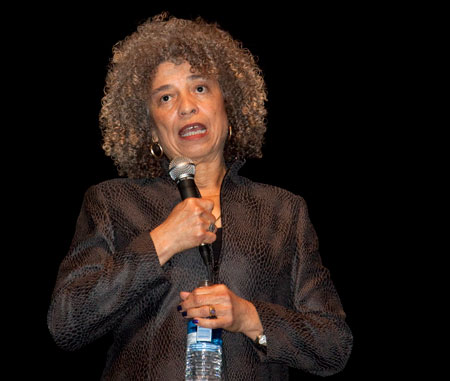This is an archive of news stories and research from the National Union of Public and General Employees. Please see our new site - https://nupge.ca - for the most current information.
Celebrated American 'academic activist' tells Black History Month audience in Canada that 'activism should be a joy.'
Ottawa (4 Feb. 2010) - Half a century after the civil rights movement in the United States, the struggle for freedom continues and will never end because its frontiers are forever expanding, says Angela Davis, an 'academic activist' and acclaimed civil rights leader who was once on the FBI's most-wanted list.
 |
| Angela Davis speaks in Ottawa |
Now a retired professor at the University of California in Santa Cruz, Davis was the featured speaker this week at celebrations marking Black History Month in Ottawa. Her visit was arranged by the Student Federation of the University of Ottawa (SFUO).
February was declared Black History Month in Canada by Parliament in 1995. With each passing year the celebration has gained broader recognition across the country.
"We haven't finished the struggle for civil rights," said Davis, who was tried and acquitted by an all-white jury following the 1970 shooting of a California judge in a botched prisoner rescue bid. Subsequently, she ran as a 1984 vice-presidential candidate for the Communist Party USA but she is no longer a party member. She describes herself today as a democratic socialist.
Freedom is broader than civil rights
Davis said there is a tendency in Black History Month celebrations to focus on civil rights and the achievements of well known activists from the 1960s such as Martin Luther King, Rosa Parks and Medgar Evers. Yet the movement has always been about the broader issue of freedom and the legions of ordinary activists who made it possible, she said.
She mentioned unsung heroes like Jo Ann Robinson, who transformed Parks' 1955 arrest for refusing to yield her seat to a white passenger into a landmark civil rights event by doing the hard work of organizing the now famous Montgomery Bus Boycott.
Similarly, Davis said the election of Barack Obama as the first black president of the United States, while a powerful moment in history, is even more remarkable for the grassroots movement it inspired, especially among young people.
Progress always depends on mass involvement by ordinary people, she said. "We have to hold onto the movement.... It's pretty sad the way we are always looking for messiahs."
Today a host of issues are crying out for reform and social justice, she said. Specifically, she mentioned the struggle of undocumented immigrants and the LGBTI (lesbian, gay, bisexual, transgender and intersex) movement, including the ongoing question of gay marriage and gays in the military.
'Prison industrial complex'
Davis also talked at length about the "prison industrial complex" in the United States – an issue that has taken up much of her time in recent years.
She condemned "the punishment industry" spurred on by corporate America with the acquiescence of U.S. politicians, resulting in the incarceration of 2.3 million people. The rate of imprisonment in the U.S. is now one of the highest in the world – roughly seven times the per capita level in Canada.
Prisons have become the place where the U.S. dumps marginalized members of society that it no longer wants to deal with, she said, noting that in prison human beings lose all rights. "In legal parlance, that is civil death," she added.
Davis said the problem is worsened by vast privatization of the American correctional system, thus linking the treatment of prisoners directly to a capitalism system. The "assault against labour" behind prison walls is the main reason that the private prison industry is so profitable, she said.
She argued that the need for activism is as a great today as it ever has been and urged members of her audience to focus their energies on relevant social issues of their time.
"Activism should be a joy," she said. "And if we we are going to change the world we have to be willing to change ourselves as well."
NUPGE
The National Union of Public and General Employees (NUPGE) is one of Canada's largest labour organizations with over 340,000 members. Our mission is to improve the lives of working families and to build a stronger Canada by ensuring our common wealth is used for the common good. NUPGE
More information:
National Union celebrates Black History Month
